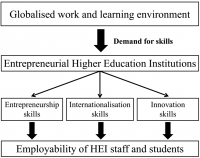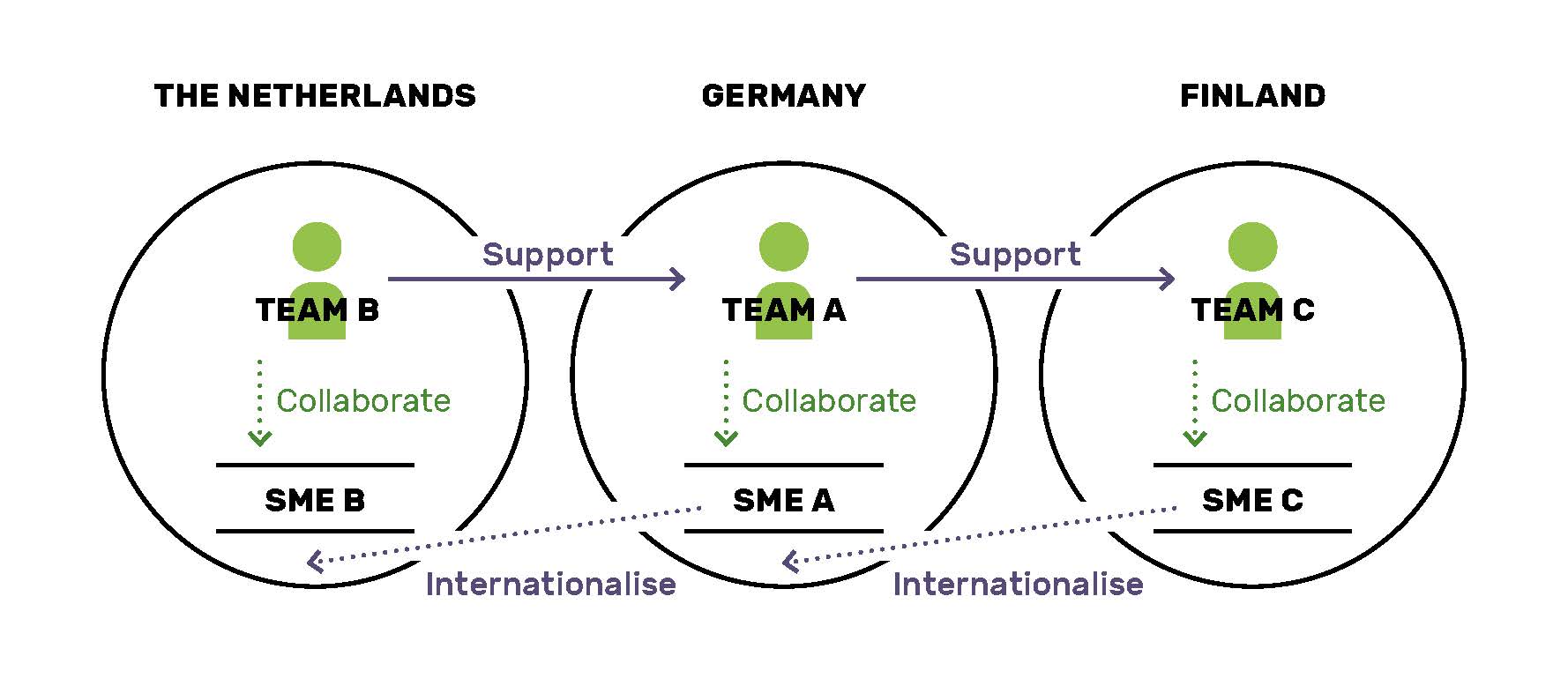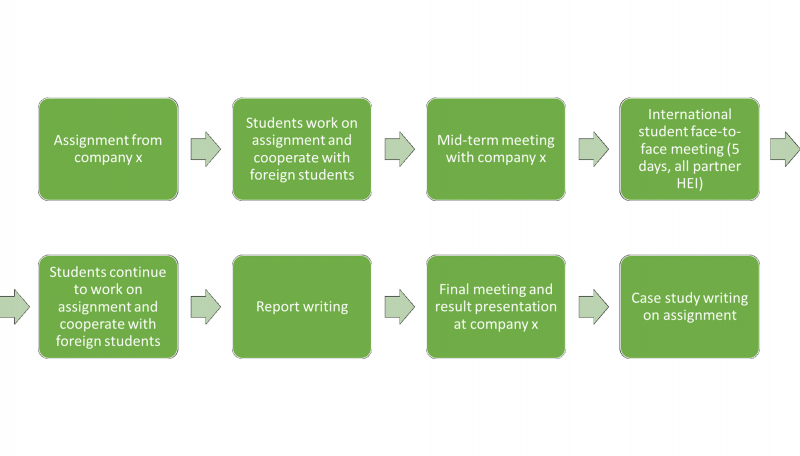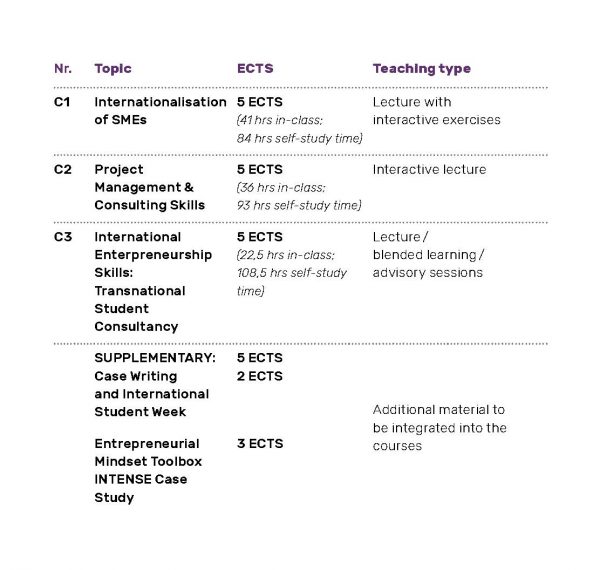The INTENSE Teaching Approach:
Globalisation has changed the constraints of work and learning. As a result, the labour market expects graduates and staff of Higher Education Institutions (HEI) to be able to interact in global settings. This poses a challenge to HEI, which are expected to promote the employability of students and staff. As a response, the concept of entrepreneurial universities has developed, which seek to foster entrepreneurial development in teaching and learning. These objectives are closely linked to the educational concepts of internationalisation, entrepreneurship education, and innovation pedagogy (see Figure 1).
Figure 1: Education Framework: Boosting the Employability of HEI Students and Staff

Source: Saulich and Lehmann (2017, p. 904)
Looking at the literature, we tried to match the necessary skills with the teaching and learning methods in Table 1.
Table 1: Relevant Sets of Skills for Internationalisation, Entrepreneurship, and Innovation

Source: Saulich and Lehmann (2017, p. 903)
Within the “INTENSE – INTernational Entrepreneurship Skills Europe” project we aim to incorporate these elements into the curricula of HEI. The aim of INTENSE is to develop and implement a transnational teaching module on the internationalisation of small and medium-sized enterprises (SMEs) as an Open Educational Resource.
For more information on how we incorporate this framework in our teaching material and approach, please refer to:
- Saulich, Christina & Lehmann, Tine (2017): Boosting the Employability of Students and Staff at European Higher Education Institutions: An Educational Framework for Entrepreneurship, Internationalisation and Innovation. In: Domenech i Soria, Josep et al. (Hrsg.): Conference Proceedings of the 3rd International Conference on Higher Education Advances (Head’17). Valencia: Universitat Politècnica de València, pp. 899-907. (Link)
For a quick introduction to how our project developed and what the main benefits are, please refer to:
- Jokiniemi, Sini (2017): INTENSE – Entering New Markets Successfully. Journal of Excellence in Sales 2017(2). URL: https://issuu.com/turunamk/docs/journal_of_excellence_in_sales_2_20 [22.08.2019], pp. 19-21.
For more information on the role of innovation competencies in our teaching framework, please refer to:
- Hänti, Sirpa; Kairisto-Mertanen, Liisa & Rantanen, Helena (2018): Learning Innovation Competences and International Entrepreneurship. Paper presented at the ISPIM Innovation Conference – Innovation, The Name of The Game. Stockholm, 17-20 June 2018. https://search.proquest.com/openview/42c03db55cb07181e080c0db7ab9362c/1?cbl=2040562&pq-origsite=gscholar.
A major component of our teaching approach is the transnational student consultancy. The teaching module is taught parallel at all INTENSE partners. Before or simultaneously, students receive training in international management and project management and consulting skills. These teaching materials are unified among all INTENSE partners but adopted to the curricular and demand of each partner university. You can find all the teaching material below.
The consultancy project is designed for students who are in the midst or end of their bachelor studies. Here students consult a real SME in its internationalization adventure. The consultancy project is supplemented by a blended learning course. In order to enhance the students’ internationalisation skills, student teams cooperate transnationally as demonstrated in the example in Figure 2.
Team A in Germany collaborated with SME A, also based in Germany. SME A wanted to internationalise to the Netherlands. Team B, based at an HEI in the Netherlands, supported team A. Team B provided Team A with relevant knowledge of the Dutch market. At the same time, Team A provided specific information on the German market to Team C. Team C is based in Finland and collaborated with the Finish SME C who sought to internationalise to Germany.
Figure 2: Transnational Student Consultancy

Source: Lehmann, Saulich, & Wohlgemuth (2018, p. 307)
The general process of teaching and organizing the consulting project can be seen in the figure below.
Figure 3: Consultancy course process

Source: Rantanen, Helena (2018, p. 30)
For more information on our student consultancy approach, please see:
- Lehmann, Tine; Saulich, Christina & Wohlgemuth, Veit (2018): Transnational Student Consultancy – an Integrated Approach to Business Students’ Learning. Domenech, Josep et al. (Hrsg.): Conference Proceedings of the 4th International Conference on Higher Education Advances (Head’18). Valencia: Universitat Politècnica de València, pp. 303-311. (LINK)
For more information on the experience and the processes in teaching the course, please see:
- Rantanen, Helena (2018): INTENSE Pilot Run: Positive Experiences in Internationalization. Journal of Excellence in Sales 2018(1). URL: https://issuu.com/turunamk/docs/journal_of_excellence_in_sales_1_20_dab0654f76d63e [22.08.2018].
Our teaching material contains course material for 15 ECTS structured as displayed below” and then ad the pic in the attachment

By clicking the following link (teaching materials), you expressly agree to use the downloaded materials only for teaching purposes in accordance with the rules of intellectual property.
In order to use the teaching materials, we have prepared teaching manual which can be downloaded at this link.
